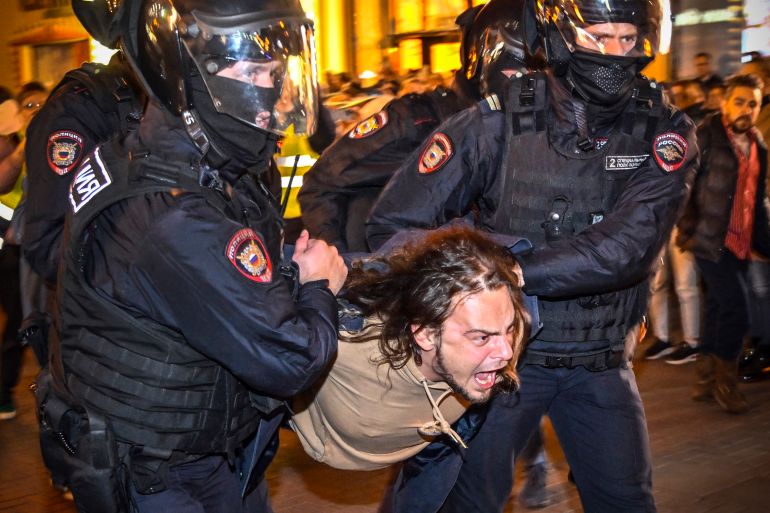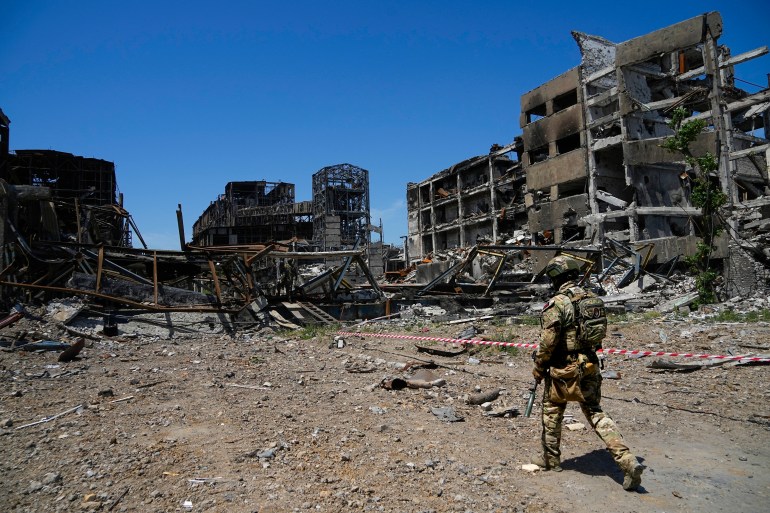In Russia’s far east, fear and defiance against military call-up
Long queues form at Russia’s borders as men try to leave the country as they fear being called up to fight in Ukraine.

Hours after Russian President Vladimir Putin announced the partial mobilisation on Wednesday in the wake of Moscow’s battlefield setbacks in Ukraine, Hoelun received a call from her mother to pack her things.
Hoelun is from Buryatia, a republic in Siberia in Russia’s far east.
Keep reading
list of 3 itemsUkraine to reduce Iran embassy presence over Russia drone attacks
Russia announces exemptions from Ukraine war mobilisation
As a former serviceman, her 29-year-old boyfriend was eligible to be drafted and, after a short refresher course, deployed to the front lines in eastern Ukraine.
“She [mother] and my dad picked us up, and by midnight we were at the border town of Kyakhta,” she told Al Jazeera from Mongolia.
“There were still relatively few cars, a little more than usual. We stood for two hours before they let us into the border zone, then for another three hours as we stood in line. We were asked to take all our belongings out of the car and they examined all the bags.
“I had the feeling that the border guards were working very slowly on purpose. My dad told them we are visiting relatives in Mongolia, and the guards didn’t ask any questions. A giant queue had already formed behind our car,” she said.
Since Wednesday, many families have had sleepless nights in Buryatia as they are worried their loved ones could be called up.
Although defence minister Sergey Shoigu promised that only 300,000 reservists would be drafted, sources in the presidential administration told Russian independent media that the real figure in Putin’s decree was more than a million.
On Saturday, Putin signed a decree, toughening penalties for those fleeing a mandatory military call-up by up to 10 years of jail.
“We’ve had thousands [of draftees and their families] contacting us,” said Viktoria Maladaeva of the Free Buryatia Foundation, a group that campaigns against the war. “Right now, we’re busy evacuating everyone.”
According to Buryat activists, eligible men were awoken by summons officers at night and given half an hour to pack their belongings before being driven away to report for duty.
In the capital, Ulan-Ude, students told the independent media site The Village that military police and national guardsmen arrived at the Buryat State University on Thursday morning to remove about a dozen of their classmates from their classes.
“Here in Buryatia they’re mopping up everyone in a row – young and old, and those who’ve never served at all,” an anguished Hoelun said. “It’s a nightmare there. My heart bleeds.”

Categories
Potential draftees are, at least on paper, divided into three categories sorted by age, rank and position.
The first category comprises soldiers and sailors aged 35 and below and officers aged up to 65 up to the rank of general.
They should theoretically be mobilised first.
Ryu, who did not want to give her full name, told Al Jazeera how on Wednesday night a summons came for her 45-year-old father, even though his age and lack of experience exclude him from the first category.
He has neither completed national service nor military classes at university.
“Two officials in civilian clothes issued the summons and asked him to sign for a receipt,” she said. “We’re now examining the documents for AGS [alternative civil service].”
AGS is an option available for those who can prove their personal or religious beliefs are incompatible with military service, as well as members of certain ethnic minorities living a traditional way of life.
But getting it is a long and bureaucratic process, while the applicant is pressured by military recruiters.
The Russian president on Saturday announced some exemptions for bankers, IT workers and journalists, even as the move has sparked protests and forced people to flee to neighbouring countries.
Long queues
Elsewhere in Russia, long queues have been reported at the frontiers with Georgia, Finland, and Kazakhstan, where men were questioned about their military eligibility before being allowed through.
But leaving their lives behind is, understandably, not an option for everyone.
“This is a catastrophe,” said Ilnur, who served in the aerospace forces during 2017-18. “Knowing how conscripts are trained and how you can lose your skills and physical training in only a year, I can safely say they’re being marched to the slaughter.
“Of course I’m afraid. I’m not ashamed to admit it. I really want to live. This year my career has started to grow and I don’t want to trade my well-fed, quiet life for the trenches near Donetsk. But I can’t do anything. I can’t go abroad and work there remotely, and the mortgage on my house has severely clipped my wings,” he added.
Other potential draftees have accepted their fate.
“Yesterday four of my friends got the notice – I haven’t. I guess engineers aren’t needed yet,” Denis, a former sergeant in the engineer corps, told Al Jazeera. “Of course I’m scared. Who isn’t scared of war? But if I have to, I’ll go.”
Chechen leader Ramzan Kadyrov announced his republic would not press forward with mobilisation as it had filled 254 percent of its quota already.
Meanwhile, the head of the Crimean Peninsula, Sergei Aksyonov, said his son had also enlisted.
“There are no differences for anyone at all, the law is the same for everyone,” he told reporters. “Today my son was called up and [he] reported to the unit that very morning … I’m proud of my son.”
But not everyone in Russia’s elite has been so enthusiastic.
During a live stream on YouTube, allies of imprisoned opposition leader Alexey Navalny prank-called Kremlin spokesman Dmitry Peskov’s son Nikolai, pretending to be from the army enlistment office.
Nikolai refused to report in, saying he would be “resolving this matter on a different level”.